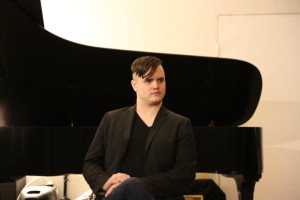Brian Erickson
We are thrilled to feature Brian Erickson as our November Composer of the Month. On November 8th, 2015, we gave the world premier of his work, “and so I did…” at Spectrum. Click here for more info on the concert.
WSW: When did you start composing?
BE: I started composing seriously in high school – I wrote works for bands I had been playing in, and also piano arrangements for performers at my school.
WSW: What drew you to composing?
BE: I had already been heavily involved with music (as well as theater); singing in all of the choirs, touring with a band, that sort of stuff. I guess that it just started happening that I was writing music and having my musician friends perform it – getting more and more serious about it the more that I did it (and realizing that I could do it).
WSW:Do you play an instrument or sing?
BE: I play the piano, guitar, and sing – none of these professionally, though.
WSW: Where do you usually compose?
BE: First, on a small sketchpad, then I punch it into Sibelius. I take both of these with me everywhere, so I can write wherever I go. I’m not necessarily ritualistic about my composing, though I do set certain hours aside strictly for composing.
WSW: Which composer do you admire?
BE: One of the composers I’m really loving right now is Gérard Grisey – I’m writing a companion piece to his piece Vortex Temporum for Marilyn Nonken at the moment. I really appreciate his great sense of development, and, despite how slow the pace of the development can be, the overall arc of the work is very complex and filled with brilliant tangents which are later tied back into the piece at just the right times. I’ve adopted his sense of long-term thinking into my pieces, definitely.
WSW: What do you do in your free time?
BE: I’m usually reading when I’m not composing, currently finishing up Anti-Oedipus: Capitalism and Schizophrenia by Gilles Deleuze, and recently read a great biography on Stalin by Ian Grey.
I love reading – and playing Grand Theft Auto V. And Call of Duty. And Minecraft.
WSW: Tell us a little about your piece – what should the audience know, etc?
BE: This piece is in my older style – and has a very tonal basis. I’ve taken the bass motion from the Pavane (that of falling thirds) and focused in on that motion as a basis for the work. The pacing of this piece is much more drawn out and slower than that of the Pavane, but there are certainly musical elements that can be associated with it.
The music that I’m writing now, in addition to keeping the character and expression in my older music, has adapted a new language and new musical gestures to convey ideas in a more immediate, urgent, and articulated manner. Regardless, this is a good look back on what I have previously written and focused on – and I’m grateful that Washington Square Winds will perform it.
WSW: What are your thoughts on Pavane and Faure? Do you like them?
BE: I’ve always had a place in my heart for Fauré – the end of the Offertoire from his Requiem ranks pretty high in the most beautiful moments in music that I’ve heard.
The Pavane preserves a character in Fauré that I’ve always appreciated – his music is unassuming, yet it can be absolutely breathtaking at times. Unfortunately, Fauré was a bit of a racist.
WSW: Have any experiences performing, etc?
BE: As referenced above, I sang a good deal during my childhood/teenage years, including singing at Carnegie Hall, performing for various community organizations, etc. I also toured playing guitar in metal bands – that was fun.
Visit: brianericksonmusic.com for more info on Brian!






